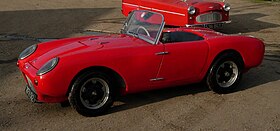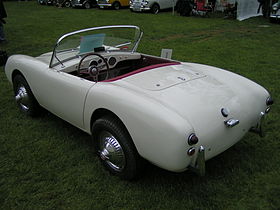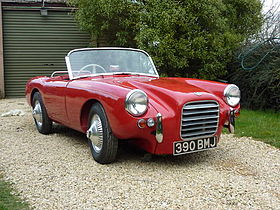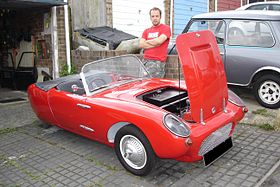Berkeley cars
 |
|
| Industry | Motor vehicle |
|---|---|
| Fate | bankruptcy |
| Founded | 1956 |
| Defunct | 1960 |
| Headquarters | Biggleswade, England, UK |
|
Key people
|
Charles Panter, Lawrie Bond |
| Products | SA322, SE328, SE492, T60, B95, B105 |
| Berkeley Sports SA322 | |
|---|---|
 |
|
| Overview | |
| Production | Oct 1956 - Jan 1957 163 produced |
| Body and chassis | |
| Body style | 2-door roadster |
| Powertrain | |
| Engine | 322cc transverse two stroke twin, air-cooled |
| Dimensions | |
| Wheelbase | 70 in (1,800 mm) |
| Length | 123 in (3,100 mm) |
| Width | 50 in (1,300 mm) |
| Height | 41.5 in (1,050 mm) |
| Curb weight | 605 lb (274 kg) |
| Berkeley Sports SE328 | |
|---|---|
 |
|
| Overview | |
| Production | Jan 1957 – Apr 1958 1259 approx produced. |
| Body and chassis | |
| Body style | 2-door roadster |
| Powertrain | |
| Engine | 328cc transverse two stroke twin, air-cooled |
| Dimensions | |
| Wheelbase | 68 in (1,700 mm) |
| Length | 122.5 in (3,110 mm) |
| Width | 50 in (1,300 mm) |
| Height | 43.5 in (1,100 mm) |
| Berkeley Sports SE492 | |
|---|---|
 |
|
| Overview | |
| Production | Oct 1957 – Mar 1959 666 approx produced. |
| Body and chassis | |
| Body style | 2-door roadster |
| Powertrain | |
| Engine | 492 cc transverse two stroke three cylinder, air-cooled |
| Dimensions | |
| Wheelbase | 70 in (1,778.0 mm) |
| Berkeley Foursome | |
|---|---|
 |
|
| Overview | |
| Production | 1958–1959 20 approx produced. |
| Body and chassis | |
| Body style | 2-door roadster |
| Powertrain | |
| Engine | 492 cc transverse two stroke three cylinder, air-cooled |
| Dimensions | |
| Wheelbase | 78 in (1,981.2 mm) |
| Length | 131 in (3,300 mm) |
| Width | 54 in (1,371.6 mm) |
| Height | 46 in (1,200 mm) |
| Berkeley B95 and B105 | |
|---|---|
 |
|
| Overview | |
| Production | Mar 1959 – Dec 1960 178 approx produced. |
| Body and chassis | |
| Body style | 2-door roadster |
| Powertrain | |
| Engine | 692 cc transverse four stroke twin, air-cooled |
| Dimensions | |
| Wheelbase | 70 in (1,778.0 mm) |
| Length | 125 in (3,200 mm) |
| Width | 50 in (1,270.0 mm) |
| Height | 45 in (1,143.0 mm) |
| Curb weight | 886 lb (402 kg) |
| Berkeley QB95 and QB105 | |
|---|---|
| Overview | |
| Production | 1959 2 approx produced. |
| Body and chassis | |
| Body style | 2-door roadster |
| Powertrain | |
| Engine | 692 cc transverse four stroke twin, air-cooled |
| Dimensions | |
| Wheelbase | 78 in (1,981.2 mm) |
| Length | 133.5 in (3,390 mm) |
| Width | 54 in (1,371.6 mm) |
| Height | 46 in (1,168.4 mm) |
| Berkeley T60 | |
|---|---|
 |
|
| Overview | |
| Production | Sept 1959 – Dec 1960 1800 made |
| Body and chassis | |
| Body style | 2-door roadster |
| Powertrain | |
| Engine | 328 cc transverse two stroke twin, air-cooled |
| Dimensions | |
| Length | 122.5 in (3,110 mm) |
| Berkeley T60/4 | |
|---|---|
| Overview | |
| Production | Oct – Dec 1960 approx 50 made |
| Body and chassis | |
| Body style | 2-door roadster |
| Powertrain | |
| Engine | 328 cc transverse two stroke twin, air-cooled |
| Dimensions | |
| Length | 122.5 in (3,110 mm) |
| Berkeley B65 | |
|---|---|
| Overview | |
| Production | Sept - Dec 1960 Less than 20 produced. |
| Body and chassis | |
| Body style | 2-door roadster |
| Powertrain | |
| Engine | 492 cc transverse two stroke three cylinder, air-cooled |
| Dimensions | |
| Wheelbase | 70 in (1,778.0 mm) |
Berkeley Cars Ltd /ˈbɑːrkliː/ of Biggleswade, Bedfordshire, England produced economical sporting microcars with motorcycle-derived engines from 322 cc to 692 cc and front wheel drive between 1956 and 1960.
The Berkeley automobile was a collaboration between designer Lawrence "Lawrie" Bond and the Berkeley Coachworks factory owned by Charles Panter, which at the time was one of the largest manufacturers of caravans in Europe. It was an ideal project for Berkeley, who had developed considerable skills in the use of Glass-reinforced plastic (GRP), and were looking for something to fill the gaps in the very seasonal caravan market. What Panter and Bond wanted to achieve was "something good enough to win World 750cc races... but cheap, safe, easily repairable and pretty."
The early cars were an immediate success on the home market, and several derivative models were spawned over the four years of car production. Export markets, most notably the United States, were exploited and the cars earned a reputation for fun, if fragile, sports motoring on a budget. Recognising the threat posed by the newly introduced Mini and Austin-Healey Sprite in the late fifties, the company started to develop are a more conventional model with the support of Ford.
The caravan market collapsed towards the end of 1960, and Berkeley's poor cash flow forced the company into liquidation on 12 December 1960, taking its car manufacturing activities with it. After having produced about 4100 cars of various types, the workforce was laid off shortly before Christmas that year. An attempted sale of the company to Sharp's Commercials Ltd (manufacturer of the Bond Minicar) came to nothing, and the company's assets were liquidated in 1961.
...
Wikipedia
